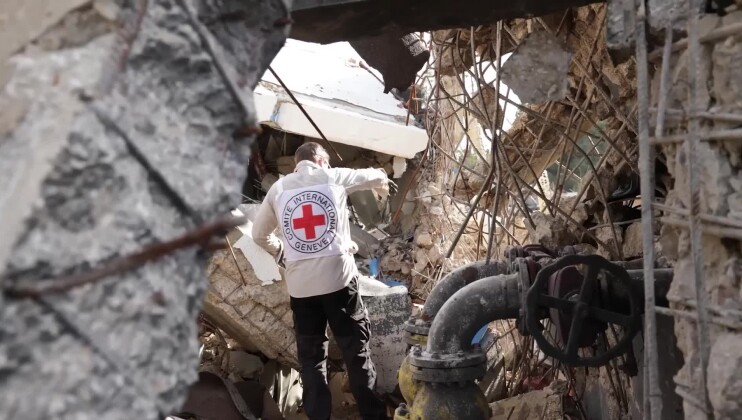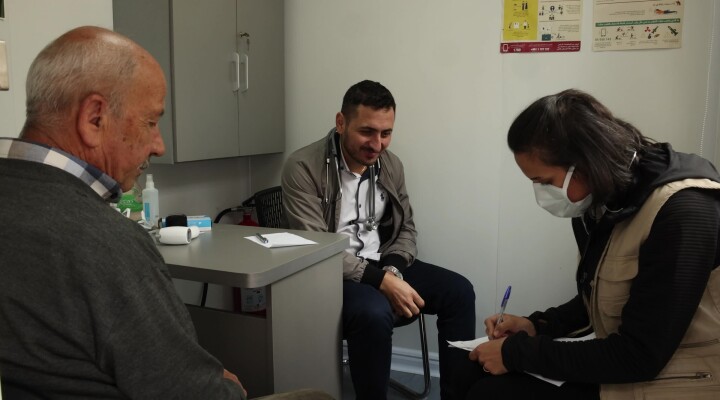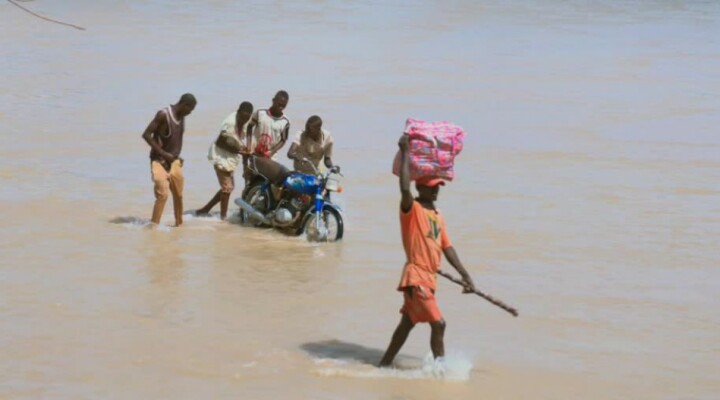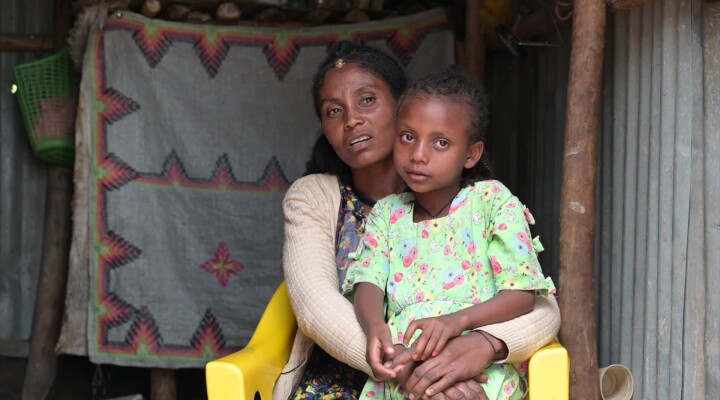Burkina Faso: When words fail, children draw their pain
For several years, Burkina Faso has faced armed violence that forces many civilians to abandon their homes, often after witnessing atrocities. But being safe from physical danger does not mean being completely secure: night terrors, nightmares, family, social and professional isolation... The violence seen and endured leaves serious psychological scars.
The regional university hospital, although equipped with a psychiatry department, only deals with the most serious cases, such as people injured by weapons. Children are particularly at risk because they do not have the same ability as an adult to express themselves or ask for help.
At the age of 15, Aly had to wait three years before he could confront the traumatic events he witnessed, which forced him and his family to flee their locality. They found themselves in a neighborhood on the outskirts of Ouahigouya, in the north-west of Burkina Faso.* . "We started with traditional medicines and then modern medicine but without success," explains Aly's father. His son's headaches and night terrors did not stop.
* A figure was given in the previous version of this text. This figure did not correspond to the total number of displaced people, but rather to the number of displaced people cared for by an ICRC-supported health centre.
In Ouahigouya, addressing psychological injuries is a real challenge. The regional university hospital, although equipped with a psychiatry department, only deals with the most serious cases, such as people injured by weapons. For other people like Aly, there was no other recourse before the implementation of specialized care by the International Committee of the Red Cross (ICRC).
After an awareness session on mental disorders carried out within the community by health workers, Aly's mother registered him for therapy available at the Lazaré medical centre in Ouahigouya. The ICRC trained the community health workers who take care of home follow-up, as well as a psychologist who works there.
In 2023, the ICRC identified an increasing number of children traumatized by the acts of violence they had witnessed. Therefore, it set up a project in the cities of Ouahigouya and Dori that allows children to externalize their emotions using drawing, writing and storytelling.
Little by little, children like Aly found a space for expression. They were thus able to verbalize their fears and resume a semblance of normal life: playing, eating, sleeping, interacting with others, speaking or even working at school.
Aisha, the psychologist at the Lazaré centre, reveals that Aly was suffering a lot before his therapeutic follow-up: "He felt guilty because he couldn't do anything. Some of his friends stayed there. And it was the negative emotions that troubled him. Therefore, our job was to deconstruct his emotions through the drawings he made, through the writings he had."
Over the sessions, Aly managed to master his psychological anxieties by drawing the events that haunt him. When Aisha asked him why he is happy with his drawings, Aly simply replied: "Because I was able to free myself."
In the second half of 2023, about 200 children in Ouahigouya benefited from psychological care at the Lazaré medical centre and from home follow-up by health workers. Sixty-eight of them, or 35 per cent of the children concerned, completed the therapeutic follow-ups. In Burkina Faso in 2023, 899 people received psychological care in social prevention health centres supported by the ICRC.
Today, thanks to therapy, home follow-up, and the support of his family, Aly has returned to school and has reestablished more peaceful connections with his family. "He no longer has headaches. His way of expressing himself and his behaviour have changed," Aly's father tells us, relieved.
For further information please contact:
Eléonore Asomani, CICR Dakar, Tel: +221 78 186 46 87, easomani@icrc.org
Zalissa Sanfo, CICR Ouagadougou, Tel: + +226 05 00 35 39, szalissa@icrc.org
Follow the ICRC on facebook.com/icrc and twitter.com/icrc
LOGLIST
Location: Ouahigouya – Burkina Faso
Camera: Alphonse Dioh
Filming date: 22 March 2024
Duration: 5:45
Copyright: royalty-free images
00:00:00:00–00:00:05:11
Wide shot of Ouahigouya market – Burkina Faso
00:00:05:11–00:00:13:00
Various shots of families (two shots)
00:00:13:00–00:00:23:03
Shot of the Lazaré medical centre in Ouahigouya (two shots)
00:00:23:03–00:00:28:20
Wide shot of psychologist Aisha and her patient Aly
00:00:28:20–00:00:34:04
Close-up of Aly's drawings
00:00:34:04–00:00:51:08
Various shots of Aly (three shots)
INTERVIEW ALY Patient
00:00:51:10–00:00:53:04
"When I sleep at night,
00:00:55:21–00:00:58:15
I dream that someone is chasing me.
00:00:58:21–00:01:00:00
I am running away
00:01:01:03–00:01:03:09
and people are trying to catch me.”
00:01:05:02–00:01:10:14
“Why do you sometimes run away at night?”
00:01:10:19–00:01:14:17
“I think that bad people
have come to kill my parents.”
00:01:14:23–00:01:18:15
“What do you think of your drawings?”
00:01:18:21–00:01:19:16
“I'm happy.”
00:01:21:21–00:01:23:20
“Why are you happy?”
00:01:23:23–00:01:25:22
“Because I was able to free myself."
INTERVIEW AISHA Psychologist
00:01:26:11–00:01:27:08
"He thought:
00:01:27:13–00:01:31:09
well, we have fled our area,
we could have stayed
00:01:31:17–00:01:33:03
but we were powerless.
00:01:33:08–00:01:35:22
So, there was also guilt.
00:01:36:18–00:01:39:08
He felt guilty because he
couldn't do anything.
00:01:39:16–00:01:41:16
Some of his friends
stayed there.
00:01:42:10–00:01:45:10
And it was the negative emotions that
00:01:45:24–00:01:46:22
troubled him.
00:01:47:04–00:01:50:13
Therefore, our job
was to deconstruct his emotions
00:01:50:13–00:01:54:09
through the drawings he made,
through the writings he had.
00:01:55:05–00:01:58:00
Now, he has friends.
00:01:58:00–00:02:00:08
He has managed to resume his lessons,
00:02:00:08–00:02:02:01
normally in French and Arabic
00:02:04:14–00:02:05:21
He sleeps well at night
00:02:06:16–00:02:08:08
and he no longer has nightmares.
00:02:08:19–00:02:10:17
He even has plans for the future.
00:02:11:07–00:02:12:07
So straightaway,
00:02:13:08–00:02:17:16
compared with the initial situation,
00:02:17:23–00:02:19:23
I can say there’s been a significant change.
00:02:20:08–00:02:22:05
And I find that very satisfying.
00:02:22:14–00:02:35:21
Wide shot of a community health worker arriving at Aly's family home
00:02:35:21–00:02:41:09
Shot of Aly's father
00:02:41:09–00:03:04:04
Various shots of Aly and his father (three shots)
00:03:04:04–00:03:10:03
Shot of Aly
00:03:10:03–00:03:15:10
Shot of community health worker talking to Aly's father
00:03:15:10–00:03:20:10
Shot of health worker taking notes
00:03:20:10–00:03:27:02
Shot of Aly talking to the health worker
INTERVIEW ABDOULAYE OUÉDRAOGO Aly’s father
00:03:27:06–00:03:33:10
"What made him tired
were his headaches, as well as his fear.
00:03:34:04–00:03:38:06
But since he has started the programme,
I thank God.
00:03:39:07–00:03:43:18
We started with traditional medicines
and then modern medicine but without success.
00:03:44:10–00:03:53:01
But with this programme,
we’ve noticed a big difference.
00:03:53:11–00:03:55:06
Now, we are thankful.
00:03:56:02–00:03:57:19
He no longer has headaches.
00:03:58:04–00:04:01:12
His way of expressing himself
and his behaviour have changed.”
00:04:01:20–00:04:12:13
Various shots of ICRC training for community health workers
00:04:12:13–00:04:20:07
Shot of an ICRC trainer
00:04:20:07–00:04:25:11
Shot of the community health worker who follows up with Aly
00:04:25:11–00:04:31:04
Shot of a community health worker
00:04:31:04–00:04:40:18
Various shots of Nathalie, an ICRC trainer (two shots)
INTERVIEW NATHALIE NYAMUKEBA ICRC mental health and psychosocial support (MHPSS)
00:04:40:19–00:04:46:02
"Most of the people we see
have physical complaints,
00:04:46:22–00:04:47:18
physical complaints.
00:04:47:18–00:04:51:14
Since I can't sleep at night,
I see images
00:04:51:19–00:04:54:19
of what happened in my community.
00:04:54:24–00:04:56:07
I hear voices,
00:04:57:10–00:04:59:16
I see people chasing me.
00:04:59:24–00:05:02:19
I don't want to live anymore
because I've lost everything.
00:05:02:24–00:05:06:00
I've lost my family, I've lost
my house, I’ve lost my possessions,
00:05:07:01–00:05:09:08
I've been displaced,
00:05:09:11–00:05:13:10
I can no longer send my children to school,
I can no longer feed them.
00:05:13:13–00:05:18:01
So, this is the situation they are in
when they’re referred.
00:05:18:02–00:05:21:02
But there are also others who’ll go
00:05:21:04–00:05:25:15
to receive medical care,
but the medical staff
00:05:25:15–00:05:28:22
can't find the problem
because they do medical examinations.
00:05:28:23–00:05:33:09
Everything is fine, they prescribe medicines,
there's no change,
00:05:33:22–00:05:36:23
there's no progress
and so, they think it might
00:05:36:23–00:05:40:06
not be a physical problem that
we can treat
00:05:40:10–00:05:45:07
and refer them to the psychologist so that they might
be able to see what's going on."
END



